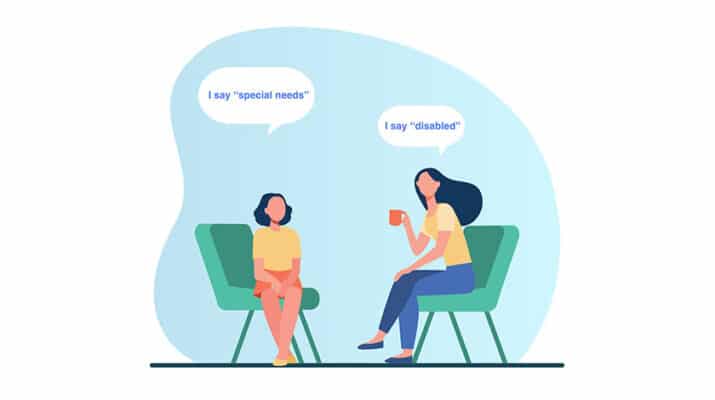Experts: avoiding the term ‘disabled’ only leads to stigmatization
By Deborah Jeanne Sergeant
Probably arising from the push for additional education support for persons with disabilities, the term “special needs” has been used for years but is beginning to fall out of favor with some groups.
“Most experts and advocates vehemently oppose the term ‘special needs’ and believe we need to eliminate it from our vernacular,” said David Oliver in a June 11 article in USA Today. “Furthermore, they say avoiding the term ‘disabled’ only leads to stigmatization.”
“Special needs” may sound like the individual has exceptional needs rather than requiring different means to obtain what every person needs.
The term “special needs” is not a legal or medical term was likely and was coined to describe the support needed beyond what people who are not disabled need. According to the Merriam-Webster dictionary, the first known use was in 1899. But these days, it is falling out of favor.
Like many other similar organizations, the New York State Office for People With Developmental Disabilities in Albany, uses “person-first language” for the people it supports.
“We agree that words or negative references can influence how the general public view people with disabilities and can also be damaging to a person’s mental health and wellbeing,” said Jennifer O’Sullivan, director of communications.
Regardless of the term used to describe disability, it is respectful to place the person first, such as “person with a learning disability” and not “learning-disabled person.”
Age can make a difference on what phrase to use. Betsy Primo, director of special children services, part of the Onondaga County Health Department, works with children from birth to age 5 in an early intervention, a family-based program.
The phrases used are “developmental differences” and “developmental delays.” The term “disability” connotates permanency, which may not be true for some delays at this age.
“If the parents themselves are disabled, what I’ve found is they prefer ‘disabled’ or ‘individual with disability,’” Primo said. “Put the human first. If we’re talking with a parent who doesn’t know a lot about early intervention or has not had other children with developmental delays, they seem to prefer ‘special needs.’”
She added that the legal term is “preschooler with a disability” to obtain needed support, although each child is treated as an individual with unique skills and needs.
“We label jars, not people,” Primo said. “We meet the child and family where they are so they can reach their highest potential.”
Viewing adults as consumers led to the use of “client” and “individual” as words of choice in the field. However, they can sound like people in a transaction and minimize the real struggles faced by people with a disability.
“Differently abled” also tends to gloss over difficulties, according to Andy Lopez-Williams, Ph.D., clinical and forensic neuropsychologist and founder of ADHD & Autism Psychological Services and Advocacy in Syracuse and Utica.
“If we err too much on being too positive, then I think we miss the point that many of these people really need help,” Lopez-Williams said. “It’s less about what you call it but more about the good faith effort to help them with compassion and respect. If we’re missing that point and being too optimistic, maybe we’re doing a disservice rather than a service.”
He compared the situation to a patient consulting with a physician about a cancer diagnosis.
“The physician is going to be straight with you and not come up with colorful names to make you feel better. But if they treat you with compassion, and respect, that makes you feel better, not a kiddish name,” he said.
The term “differently abled” may also tacitly imply savant qualities not present.
How some terms are developed comes from the deficit model approach to care in medicine or behavioral health. Lopez-Williams would rather take an approach that views every person as possessing areas of strength or need.
“If we understand that as a basis of helping people we can get rid of intrinsic disability,” he said. “It affects how we assess people.”
He wants more people to resist taking offense to terms and to notice the intent of the user of the phrase, providing it is generally respectful and compassionate and not pejorative.
“We need to have some grace and latitude,” he said. “If we do that, we’re better off. My feeling is that the terms are a distraction. They’re less important than what we do for people who have difficulties. No word has any meaning in and of itself. It’s arbitrary. A term has a clinical meaning, but as we use it as a society, it can pick up negative connotation.”
That is usually when a medical term is misused as slang. Because it is impossible to control how others misuse terms, Lopez-Williams realizes that these words reach a point at which they require replacing when it becomes insulting.
“A word starts out clinical, clean,” he said. “It has no baggage. It becomes derogatory. Everything has a lifespan. When it ages out and gets to have no utility, we replace it.”

